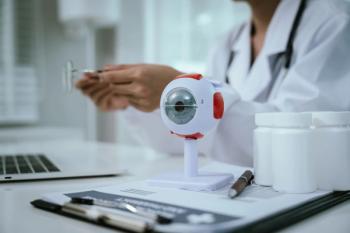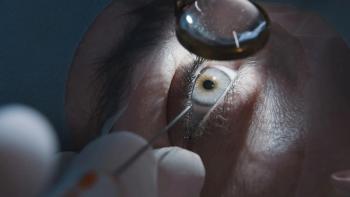
Dedicated glasses can help alleviate eyestrain, other computer vision syndrome symptoms
A pair of dedicated "computer glasses" can be valuable for alleviating symptoms in patients who suffer from computer vision syndrome.
Key Points
Optometrists can determine this prescription by performing a nearpoint refraction that is specific for the individual's computer working distance. The exam, Dr. Moscot said, should include a proprietary device (PRIO Vision, PRIO Corp.) that replicates the pixels of a computer screen.
A prescription tailored to the findings of this exam can help eliminate the need for constant refocusing. This, in turn, alleviates eyestrain and other symptoms, said Dr. Moscot, a private practitioner in New York.
Another consideration: "Younger, pre-presbyopic patients may manifest latent hyperopia, or a myope might be overcorrected with their distance prescription," he said. "Performing the refraction with the [proprietary device] will aid in uncovering this increased accommodative demand, as well as simulate how the eyes work when focusing on the computer screen."
Reduced complaints
Dr. Moscot and his colleague, Courtney Case, OD, have completed a study of almost 30 myopic or myopic/astigmatic patients, aged 18 to 35 years, who use a computer for at least 4 to 5 hours daily.
At the initial exam, they determined each patient's computer prescription and habitual computer distance using the proprietary device. They also administered a questionnaire to determine a Computer Vision Syndrome Index (CVSI) score-both before and 4 to 6 weeks after using a specific intermediate computer prescription lens (Anti-Fatigue, Essilor). Additional measurements included amplitude of accommodations, phorias, and negative/positive relative accommodation.
Results indicated a significant reduction of symptoms, with 92% of patients manifesting an improved CVSI score.
"I've been amazed to find that after just 1 month of wearing dedicated computer glasses, subjective complaints are reduced dramatically. Productivity is increased as well, and that's a benefit employers will buy into," he said.
However, patient education is critical to the success of this strategy. Pre-presbyopes often believe that using different glasses for various vision tasks is relevant only for older adults.
"I tell my patients that just as they would not consider running without wearing shoes specific to that task," said Dr. Moscot, "when working at a computer screen, they also need to have glasses that are dedicated for looking at the screen."
Additional exam elements
The ophthalmic exam of patients with CVS should also address the following:
"Convergence problems are relatively common but may not manifest until an individual is spending hours in front of a computer screen, which is particularly taxing to the binocular system," he said.
FYI
Harvey Moscot, OD
E-mail:
.
Dr Moscot has no financial interest in any products mentioned. He received some research funding from Essilor to support the computer vision syndrome study.
Newsletter
Want more insights like this? Subscribe to Optometry Times and get clinical pearls and practice tips delivered straight to your inbox.













































